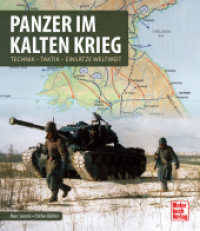- ホーム
- > 洋書
- > 英文書
- > Psychology
Full Description
Diffusion decision models are widely used to characterize the cognitive and neural processes involved in making rapid decisions about objects and events in the environment. These decisions, which are made hundreds of times a day without prolonged deliberation, include recognition of people and things as well as real-time decisions made while walking or driving. Diffusion models assume that the processes involved in making such decisions are noisy and variable and that noisy evidence is accumulated until there is enough for a decision. This volume provides the first comprehensive treatment of the theory, mathematical foundations, numerical methods, and empirical applications of diffusion process models in psychology and neuroscience. In addition to the standard Wiener diffusion model, readers will find a detailed, unified treatment of the cognitive theory and the neural foundations of a variety of dynamic diffusion process models of two-choice, multiple choice, and continuous outcome decisions.
Contents
Preface; 1. Overview; 2. Basic concepts and data; 3. Sequential-sampling models of decision making; 4. Obtaining predictions for diffusion models; 5. Empirical assessment of sequential-sampling models; 6. Time-varying diffusion models, I. Time pressure, urgency, collapsing boundaries, and optimality; 7. Diffusion models for time-controlled processing tasks; 8. Time-varying diffusion models, II. Detection and simple RT; 9. Diffusion processes driven by time-varying stimulus representations in visual working memory; 10. Neural diffusion models, I. Network and dynamical system models; 11. Neural diffusion models, II. Poisson shot noise and related models; 12. Diffusion models for continuous-outcome decision tasks; 13. Response confidence; 14. EZ and moment models, multialternative decisions, and expanded judgment tasks; References; Index.







